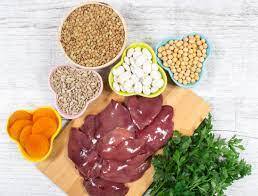

Iron is a mineral that the body needs for growth and development. Your body uses iron to make hemoglobin, a protein in red blood cells that carries oxygen from the lungs to all parts of the body, and myoglobin, a protein that provides oxygen to muscles. Your body also needs iron to make some hormones.
Iron is a mineral that’s part of hemoglobin, the protein in red blood cells that transports oxygen from the lungs and throughout the body. If your body doesn’t have enough iron, it won’t get enough oxygen, and your cells (which are powered by oxygen) won’t be able to function efficiently.
“If you’re mildly low on iron, or slightly anemic, you can experience frequent fatigue, weakness and take longer to complete tasks,” says Mary Ann Skoures, M.D., a family medicine physician with Henry Ford Health. If you’re chronically or severely low on iron, it can lead to several side effects:
a pale complexion
shortness of breath
headaches
dizziness
brittle fingernails
cold hands and feet
frequent illness
restless legs syndrome
cravings to eat ice, clay, dirt, chalk, or paper (a condition called pica)
an irregular heartbeat and heart palpitations
Here, Dr. Skoures shares reasons why you could be iron deficient and what to do about it.
Why You Could Be Iron Deficient
To get tested for iron deficiency, your doctor will draw blood to measure your hemoglobin levels. The normal hemoglobin range for women is about 12 to 15 grams per deciliter. For men, it’s 13.5 to 17.5 grams per deciliter. If you test below the normal range, your doctor may order an ultrasound, endoscopy, or colonoscopy to check for internal bleeding. If that’s not the cause, there are additional reasons you could be iron deficient:
Underlying digestive issues. If you have untreated Crohn’s disease, irritable bowel syndrome, or other digestive issues, your body may not be properly absorbing nutrients, says Dr. Skoures. Crohn’s can also cause bleeding in the digestive tract, leading to a loss of iron. If you experience frequent constipation, bloating, stomach pains or loose stools, head to your doctor.
You’re pregnant. “Your body needs twice the amount of iron to support a growing baby, so if you’re not getting enough iron, you could become deficient,” says Dr. Skoures. Pregnant women are often recommended iron supplements. If you’re pregnant, heed the advice of your doctor or midwife.
You’re menstruating. Women who menstruate lose blood every month, so it’s not uncommon for them to be slightly anemic, especially those who have heavier menstrual periods, says Dr. Skoures.
You’re not eating the rights foods. If you’re on a meat-free diet, your body may not be getting enough iron. “Although plant sources of iron are abundant (like spinach and legumes) this type of iron, called non-heme iron, is not as easily absorbed by the body as iron from meat and fish sources, which is called heme iron,” says Dr. Skoures.
You have a genetic form of anemia. Some types of anemia are hereditary, like sickle-cell anemia and thalassemia.
Genetic forms of anemia may require long-term management under a doctor’s supervision.
Posted on July 29, 2020
